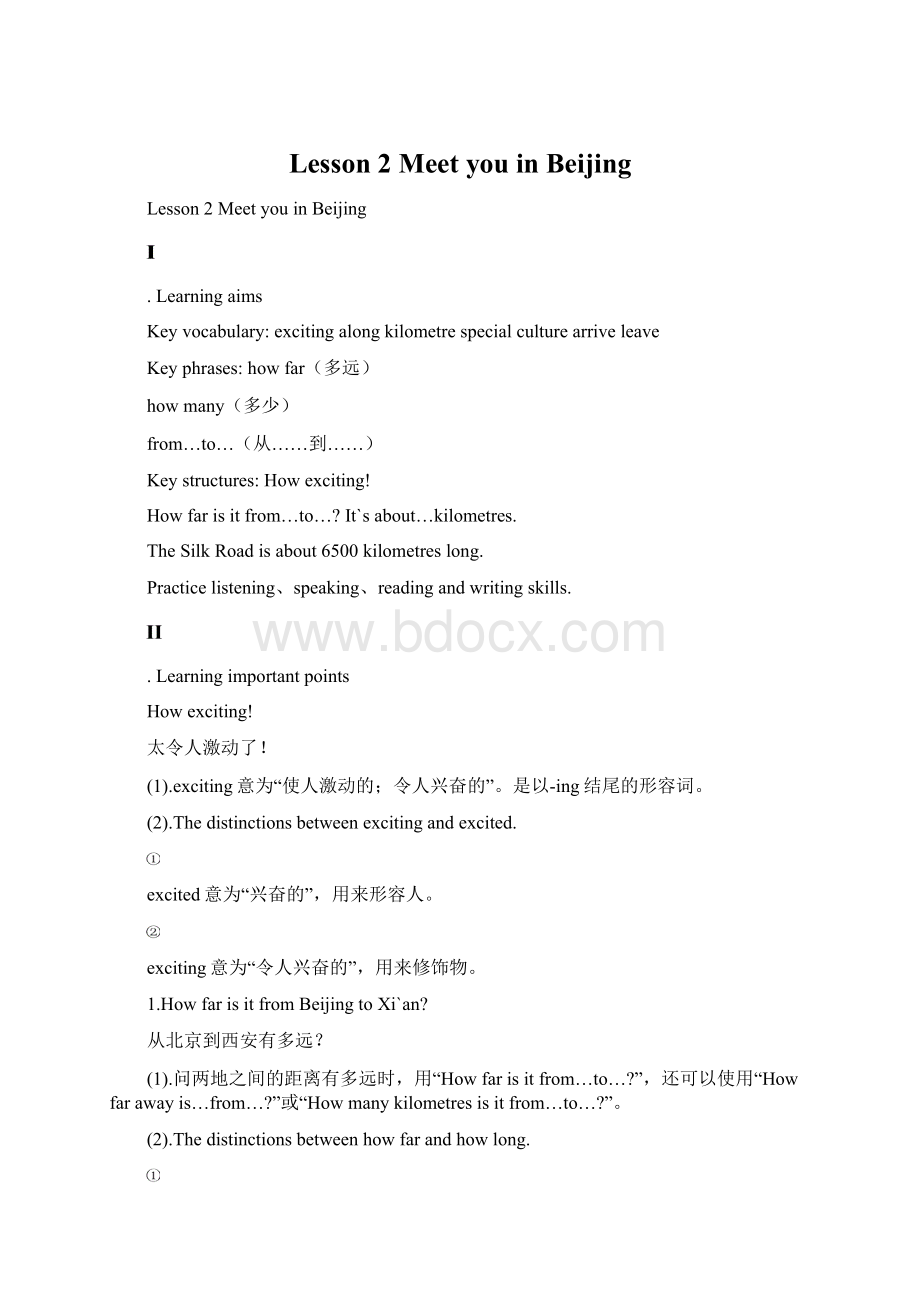Lesson 2Meet you in Beijing.docx
《Lesson 2Meet you in Beijing.docx》由会员分享,可在线阅读,更多相关《Lesson 2Meet you in Beijing.docx(10页珍藏版)》请在冰豆网上搜索。

Lesson2MeetyouinBeijing
Lesson2MeetyouinBeijing
.Learningaims
Keyvocabulary:
excitingalongkilometrespecialculturearriveleave
Keyphrases:
howfar(多远)
howmany(多少)
from…to…(从……到……)
Keystructures:
Howexciting!
Howfarisitfrom…to…?
It`sabout…kilometres.
TheSilkRoadisabout6500kilometreslong.
Practicelistening、speaking、readingandwritingskills.
.Learningimportantpoints
Howexciting!
太令人激动了!
(1).exciting意为“使人激动的;令人兴奋的”。
是以-ing结尾的形容词。
(2).Thedistinctionsbetweenexcitingandexcited.
excited意为“兴奋的”,用来形容人。
exciting意为“令人兴奋的”,用来修饰物。
1.HowfarisitfromBeijingtoXi`an?
从北京到西安有多远?
(1).问两地之间的距离有多远时,用“Howfarisitfrom…to…?
”,还可以使用“Howfarawayis…from…?
”或“Howmanykilometresisitfrom…to…?
”。
(2).Thedistinctionsbetweenhowfarandhowlong.
howfar问距离有多远。
howlong问时间多久、多长,还可以提问物体的长度。
(3).from…to…
表示从某一地方到另一地方。
例如:
fromChinatoCanada
表示从某一时间到另一时间。
例如:
HeoftenwatchesTVfromseveno`clocktonineo`clockintheevening.
3.TheSilkRoadisabout6500kilometreslong!
丝绸之路长约6500千米!
常见的度量单位有metre(米)、kilometre(千米)、foot(英尺)、mile(英里)等。
常见的用于给结构的形容词有long(长)、wide(宽)、tall(高)、deep(深)等。
例如:
Theriverisfivemetresdeep.
Theroadis2000kilometreslong.
4.ArriveinBeijingandtakeatraintoXi`an.
到达北京,乘火车去西安。
arrive意为“到达”。
当表示到达某地时,arrive后要加介词in或at。
到达较大的地方,如北京、上海等用in;到达较小的地方,如车站、学校、市场等用at。
例如:
WewillarriveinShanghaionJanuary7th.
arrive、getandreach
arrive
是不及物动词,其后若跟地点名词,要用arrivein或arriveat。
get
是不及物动词,其后若跟地点名词,要用getto。
reach
是及物动词,其后可以直接跟地点名词。
例如:
ShefinallyarrivedinNewYork.
WewillgettoBeijingtomorrow.
Lisawillreachthevillagesoon.
当arrive后接home、there、here等地点副词时,需去掉介词。
例如:
Iwillarriveherenextweek.
5.ComebacktoBeijingandleaveBeijing.
回到北京,然后离开北京。
comeback意为“回来”。
例如:
Iwillcomebacksoon.
leave用作及物动词,过去式为left,意为“离开、动身、出发”;leavefor…意为“动身去……”,for后的名词是目的地。
例如:
TheyleaveLondonforParis.
I`mleavingforBeijingtomorrow.
Mr.LileftforLanzhou.
.Learningdifficultpoints
1.WewilltravelalongtheSilkRoadtogether.
本句是一般将来时,一般将来时用于描述将要发生的动作或存在的状态。
它的基本结构是“will+动词原形”。
Wewillgetthereontime.
will结构的句式变化是:
肯定句
主语+will+动词原形+其他
否定句
主语+willnot\won`t+动词原形+其他
一般
疑问句
Will+主语+动词原形+其他?
肯定答语:
Yes,主语+will.
否定答语:
No,主语+won`t.
特殊
疑问句
特殊疑问句+will+主语+动词原形+其他?
2.Howtochangecardinalsintoordinals.
1、二、三特殊记,结尾各是t、d、d。
th,四加起,八少t,九去e,y结尾改ie。
“ve”结尾变f,five,twelve是两兄弟。
若是遇到几十几,只变个位就可以。
.LearningGuide
.AutonomicLearning
1.Reviewandlearnthenew.
(1).Fillintheblanksandlearnthekeyvocabulary.
Themovieisvery____(使人激动的)andwewilllikeit.
Walk____(沿着)thisstreetandturnleftatthecorner.
Thebridgeisabout2____(千米)long.
Sheisa____(特别的)friendofmine.
Wewilllearnabout____(文化)andhistory.
Davidwill____(到达)inBeijinginfivehours.
Shewill____(离开)NewYork.
(2).Listenandanswerthequestionsinordertoknowmoreaboutthelesson.
HowlongistheSilkRoad?
DotheyhaveenoughtimetoseeeverythingalongtheSilkRoad?
Whatwilltheylearnaboutonthistrip?
WhatdoesLiMingsendtoJenny?
HowmanydayswilltheystayinChina?
2.Readingmethods.
(1).Fullymasterthemeaningofthekeyvocabulary、phrasesandstructuresgiveninlesson1.
(2).Explainthedifficultpointsappearedinlesson1.
3.Studyandreadintensively.
(1).Usethekeystructuresofeveryparagraphtoreadeffectively.
(2).Obstaclejumpmethod.Ifyoumeetdifficultproblemsintheprocessofreading,youcanputthemasidetodealwithnewknowledge.Afterthat,youcanconcentrateyourattentiononthatdifficultproblems.
(3).Seize“keypoints”.Itcanbeeffectivetocomprehendthecontentandimplicationsofanessaythoroughlythroughanalysisandconsiderationofkeypoints.
.Dispelsuspicionusingmutualhelp.
1.Howexciting!
太令人激动了!
(1).exciting意为“使人激动的;令人兴奋的”。
是以-ing结尾的形容词。
例如:
Thebasketballmatchisveryexciting.
(2).Thedistinctionsbetweenexcitingandexcited.
excited意为“兴奋的”,用来形容人。
例如:
Iamexcitedtogetanewcomputer.
exciting意为“令人兴奋的”,用来修饰物。
例如:
Thestoryisexciting.
2.HowfarisitfromBeijingtoXi`an?
从北京到西安有多远?
(1).问两地之间的距离有多远时,用“Howfarisitfrom…to…?
”,还可以使用“Howfarawayis…from…?
”或“Howmanykilometresisitfrom…to…?
”。
例如:
HowfarisitfromLanzhoutoBeijing?
HowfarawayisLanzhoufromBeijing?
HowmanykilometresisitfromLanzhoutoBeijing?
(2).Thedistinctionsbetweenhowfarandhowlong.
howfar问距离有多远。
例如:
Howfarisitfromheretotheschool?
howlong问时间多久、多长,还可以提问物体的长度。
例如:
Howlongcanyoustayhere?
(3).from…to…
表示从某一地方到另一地方。
例如:
fromChinatoCanada
表示从某一时间到另一时间。
例如:
HeoftenwatchesTVfromseveno`clocktonineo`clockintheevening.
3.TheSilkRoadisabout6500kilometreslong!
丝绸之路长约6500千米!
常见的度量单位有metre(米)、kilometre(千米)、foot(英尺)、mile(英里)等。
常见的用于给结构的形容词有long(长)、wide(宽)、tall(高)、deep(深)等。
例如:
Theriverisfivemetresdeep.
Theroadis2000kilometreslong.
4.ArriveinBeijingandtakeatraintoXi`an.
到达北京,乘火车去西安。
arrive意为“到达”。
当表示到达某地时,arrive后要加介词in或at。
到达较大的地方,如北京、上海等用in;到达较小的地方,如车站、学校、市场等用at。
例如:
WewillarriveinShanghaionJanuary7th.
arrive、getandreach
arrive
是不及物动词,其后若跟地点名词,要用arrivein或arriveat。
get
是不及物动词,其后若跟地点名词,要用getto。
reach
是及物动词,其后可以直接跟地点名词。
例如:
ShefinallyarrivedinNewYork.
WewillgettoBeijingtomorrow.
Lisawillreachthevillagesoon.
当arrive后接home、there、here等地点副词时,需去掉介词。
例如:
Iwillarriveherenextweek.
5.ComebacktoBeijingandleaveBeijing.
回到北京,然后离开北京。
comeback意为“回来”。
例如:
Iwillcomebacksoon.
leave用作及物动词,过去式为left,意为“离开、动身、出发”;leavefor…意为“动身去……”,for后的名词是目的地。
例如:
TheyleaveLondonforParis.
I`mleavingforBeijingtomorrow.
Mr.LileftforLanzhou.
6.WewilltravelalongtheSilkRoadtogether.
本句是一般将来时,一般将来时用于描述将要发生的动作或存在的状态。
它的基本结构是“will+动词原形”。
Wewillgetthereontime.
will结构的句式变化是:
肯定句
主语+will+动词原形+其他
否定句
主语+willnot\won`t+动词原形+其他
一般
疑问句
Will+主语+动词原形+其他?
肯定答语:
Yes,主语+will.
否定答语:
No,主语+won`t.
特殊
疑问句
特殊疑问句+will+主语+动词原形+其他?
7.Howtochangecardinalsintoordinals.
一、二、三特殊记,结尾各是t、d、d。
th,四加起,八少t,九去e,y结尾改ie。
“ve”结尾变f,five,twelve是两兄弟。
若是遇到几十几,只变个位就可以。
.Inquiriesandsuggestions.
1.Fillintheblanksusingthecorrectformsofgivenverbs.
(1).When____thetrain____(leave)?
(2).We____(arrive)inChinanextweek.
(3).Bob____(visit)hisunclenextSaturday.
(4).Mybikeisbroken.I____(take)abustoschoolthisafternoon.
(5).I____(give)mymotheraspecialgiftforMother`sDaytomorrow.
(6).____you____(come)withmetoBeijingtomorrow.
.Groupwork.
Lookatthemapgivenonpage5andtaketurnsaskingandanswering:
Howfarisitfrom____to____?
Example:
A:
HowfarisitfromBeijingtoXi`an?
B:
It`sabout1114kilometres.
.Expandandimprove.
1.Couldyoutellme____itisfromhometoschool?
A.howmuchB.howlongC.howfarD.howsoon
2.Wewanttogototheconcertbecauseit`svery____.
A.boringB.boredC.excitingD.excited
3.Theywillarrive____theairportsoon.
A.atB.inC.toD.\
4.Myfather____leave____Nanjing.
A.\toB.willinC.willforD.\for
5.____isitfromheretoyourhome?
A.HowoldB.HowlongC.HowfarD.Howmuch
.Finishthetask.
1.Themeetingwilllast____2:
00p.m.to5:
00p.m.
A.betweenB.fromC.underD.at
2.Thestreetis____.
A.thirtykilometreslongB.thirtykilometresfar
C.thirtykilometrelongD.thirtykilometrefar
3.Weliketheactionmoviebecauseitis____.
A.boringB.boredC.excitingD.excited
4.Theywill____inShanghaiintwodays.
A.getB.goC.reachD.arrive
5._____isitfromBeijingtoyourhometown?
It`s230kilometres.
A.HowoldB.HowfarC.HowmanyD.Howmuch
.Challenge
1.It`stwokilometresfrommyhometothepark.(就划线部分提问)
2.Hewillvisithisgrandfatherthisweekend.(改为否定句)
3.Shewillsendmeacard.(改为同义句)
Notes: